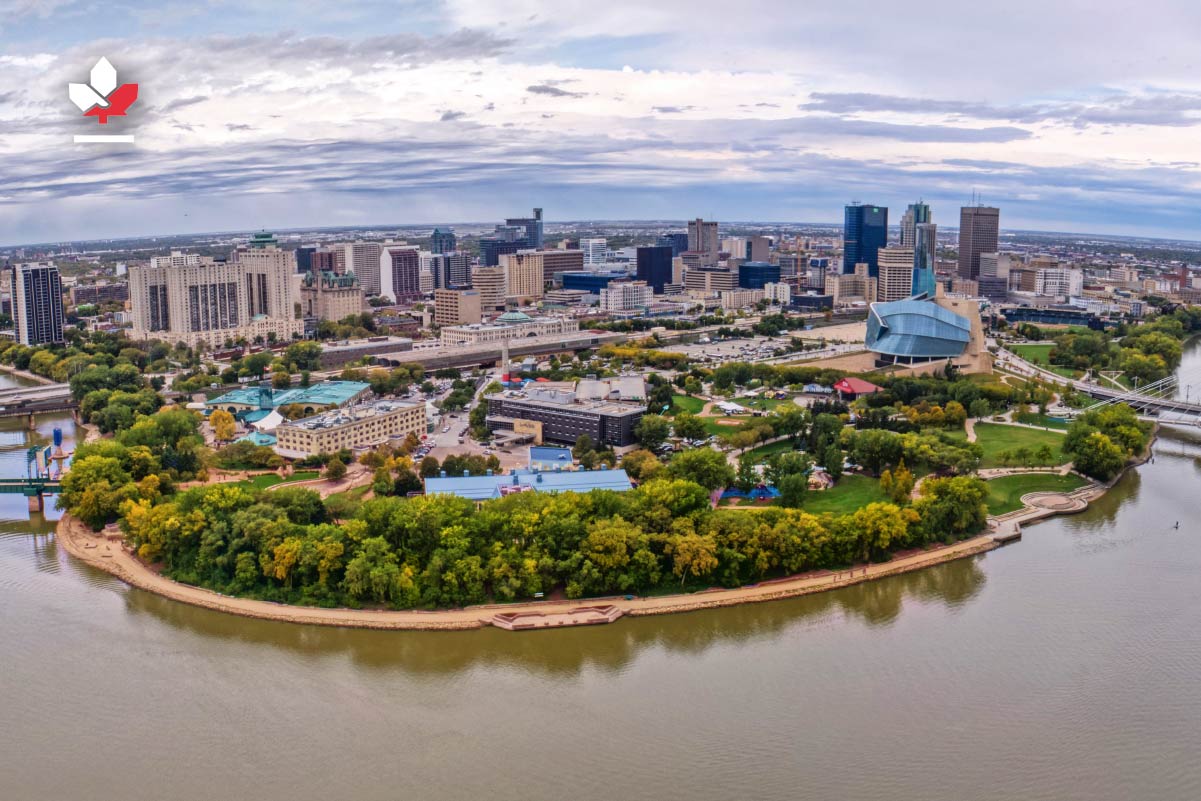Steps to Apply for the Manitoba Provincial Nominee Program
December 6, 2023
|
The Manitoba Provincial Nominee Program (PNP) allows individuals to immigrate to Manitoba and become permanent residents of Canada. With its diverse range of immigration pathways and attractive job opportunities, Manitoba has become an appealing destination for those seeking to build a better future.
Embarking on your next life phase in Manitoba, Canada? Get a head start by discovering the four steps to apply for the Manitoba Provincial Nominee Program!
What is the Manitoba Provincial Nominee Program (PNP)?

The Manitoba Provincial Nominee Program (PNP) is an immigration program designed to meet the specific economic and labor market needs of the province. It allows Manitoba's provincial government to nominate individuals with the skills and experience needed to contribute to the local economy. Successful applicants are then able to apply for permanent residency in Canada through the federal government's Express Entry system.
4 Steps to Apply for the Manitoba Provincial Nominee Program

The following are the four steps you can use to apply for the Manitoba PNP.
Step 1: Choose Your Application Method
Before starting your application, it is essential to determine which application method is most suitable for you. The Manitoba PNP offers two application methods: the Expression of Interest (EOI) system and the direct application method.
Expression of Interest Application Method
The EOI system allows individuals to submit an expression of interest to the province, indicating their desire to immigrate to Manitoba. The province then reviews the profiles and issues Letters of Advice to Apply (LAAs) to those who meet the criteria.
The LAA enables applicants to log into their Manitoba Online account and gain access to the full Manitoba PNP application process. You will be granted 60 days after receiving your LAA to submit your full application.
Direct Application Method
The direct application method, on the other hand, allows individuals to apply directly to a specific Manitoba PNP stream without submitting an expression of interest via the Express Entry system.
Step 2: Select a Manitoba PNP Stream You’re Eligible to Apply
The Manitoba PNP offers a variety of streams, each tailored to specific categories of applicants. Determining which stream you are eligible for before proceeding with your application is crucial. Here are some of the main streams available under the Manitoba PNP.
Skilled Workers in Manitoba
The Skilled Worker in Manitoba (SWM) stream enables the provincial Manitoba immigration department to nominate applicants who have a strong connection to the province through ongoing employment and sufficient skills, work experience, education and training, and official language proficiency.
To receive a provincial nomination (PN), you must also demonstrate your ability to make an immediate and ongoing contribution to Manitoba’s economic development and communities at large.
Skilled Workers Overseas
The Skilled Workers Overseas (SWO) stream is for individuals who have an established connection to Manitoba via:
- Support from family members and friends in Canada,
- Prior working experience or education in the province, and
- Receiving an ITA from Manitoba’s provincial immigration department as part of the province Strategic Recruitment Initiative.
International Education Stream
The International Education Stream is designed for international graduates who have completed their postsecondary studies in a designated learning institution (DLI) in Manitoba and want an expedited pathway to receiving a provincial nomination. This stream offers three pathways, the:
- Career Employment Pathway,
- Graduate Internship Pathway, and
- International Student Entrepreneur Pilot.
Each pathway has its specific requirements and criteria.
Business Investor Stream (BIS)
The Business Investor Stream is designed for foreign business investors and entrepreneurs who wish to establish or purchase a business in Manitoba and receive permanent residency in the province. This stream is divided into two pathways, the:
- Entrepreneur Pathway, and
- Manitoba Farm Investor Pathway (FIP).
Step 3: Gather and Submit All the Supporting Documents
Once you have determined which stream you are eligible for, it is time to gather and submit all the required supporting documents. These documents may include:
- Passport copy,
- Passport photo,
- Payment form & proof of payment,
- If you have visited Manitoba, proof and report on an exploratory visit i.e Visitor Visa,
- Submit details of an intended business venture,
- Documents of your spouse and dependent children,
- Proof of Language proficiency via International English Language Testing System (IELTS) or Test d’évaluation de français (TEF Canada),
- Employment information / Business Ownership/ Work Experience,
- Financial records and bank statements,
- Country-specific documents if required,
- Medical clearance,
- Police clearance, and
- Settlement plan.
It is crucial to ensure that all documents are genuine, complete, and meet the specific requirements of the Manitoba PNP.
Step 4: Pay Your Application Fees and Apply
The final step in the Manitoba PNP application process is to pay the required application fees and submit your application. The application fees vary depending on the stream you are applying under and the number of family members included in your application. However, the Manitoba PNP generally has a non-refundable application fee of 678.10 CAD. Ensure to use Microsoft Edge to submit your application successfully.
It is essential to carefully review the fee structure and ensure that all fees are paid in full to avoid any delays or complications in the processing of your application.
Why Move to Manitoba

Job Opportunities in Manitoba
Manitoba offers a wide range of job opportunities across various sectors, including healthcare, education, technology, and agriculture. The province has strong economy and low unemployment rate makes it an attractive destination for individuals seeking employment and career growth.
Learn more about Manitoba’s job opportunities through its in-demand occupations list.
Manitoba’s Inexpensive Living Costs
One of the significant advantages of living in Manitoba is its relatively low cost of living compared to other provinces in Canada. Housing, transportation, and daily expenses are more affordable, allowing individuals and families to enjoy a higher standard of living while saving money. This is reflected in Winnipeg’s, Manitoba’s prime city, lower estimated monthly living expenses compared to its neighboring major prairie cities such as Saskatoon and Calgary.
| Estimated Average Monthly Living Costs | Cost in Winnipeg (CAD) | Cost in Saskatoon (CAD) | Cost in Calgary (CAD) |
|---|---|---|---|
| For a Family of Four | 4,765.6 | 4,807.2 | 5,593.4 |
| For a Single Person | 1,341.0 | 1,363.8 | 1,604.2 |
Manitoba’s Scenic Environments
Manitoba is renowned for its stunning natural beauty, with vast forests, pristine lakes, and breathtaking landscapes. The province offers numerous opportunities for outdoor activities such as hiking, fishing, camping, and wildlife watching. National parks you can visit in Manitoba to better appreciate its’ scenic beauty include:
- Riding Mountain National Park,
- Wapusk National Park,
- Grand Beach Provincial Park, and
- Atikaki Provincial Wilderness Park.
Multiculturalism in Manitoba
Manitoba is a diverse and multicultural province, welcoming individuals from all over the world. The province celebrates its cultural diversity through various festivals, events, and community initiatives, creating a vibrant and inclusive environment for residents. Events celebrating multiculturalism in Manitoba include:
- Islendingadagurinn,
- Canada’s National Ukrainian Festival,
- Folklorama, and
- Festival du Voyageur.
Affordable Housing in Manitoba
Finding affordable housing is often a priority for individuals and families looking to relocate. Whether you prefer urban living or a more rural setting, you can find affordable housing options that meet your needs, making Manitoba an attractive place to call home. This is reflected in the lower apartment rent costs in Winnipeg, Manitoba compared to Calgary, Alberta. Figures obtained from Numbeo.com.
| Type of Apartment | Cost in Winnipeg (CAD) | Cost in Calgary (CAD) |
|---|---|---|
| 1 bedroom Apartment in the city center | 1,261.47 | 1,896.39 |
| 3 bedroom Apartment in the city center | 2,020.59 | 3,054.00 |
Manitoba’s Proximity to Other Cities
Manitoba's central location within Canada makes it an ideal base for exploring other cities and provinces. With its proximity to cities like Winnipeg, Saskatoon, and Calgary, you can easily travel and explore different parts of the country. Whether you enjoy weekend getaways or want to explore new cities, Manitoba's location provides convenient access to various destinations.
FAQs
Can I Apply to MPNP Even if I Have Been Previously Refused by Another Province for Permanent Residency in Canada?
Yes, you can apply to the Manitoba Provincial Nominee Program even if you have been previously refused by another province for permanent residency in Canada. The Manitoba PNP has its own set of eligibility criteria and requirements, and a previous refusal from another province does not automatically disqualify you from applying to the Manitoba PNP.
Can I Use an Immigration Representative to Apply to MPNP?
Yes, you can use an immigration representative to assist you with your MPNP application. An immigration representative can provide guidance, help you navigate the application process, and ensure that your application is complete and accurate. However, it is important to choose a qualified and authorized immigration representative to avoid any potential scams or fraud.
Do I Need to Advise MPNP if I Have Applied Previously to Another Provincial or Federal Immigration Program?
Yes, you need to advise the Manitoba Provincial Nominee Program if you have applied previously to another provincial or federal immigration program. It is important to provide accurate and complete information about your immigration history to avoid any complications or delays in the application process.
